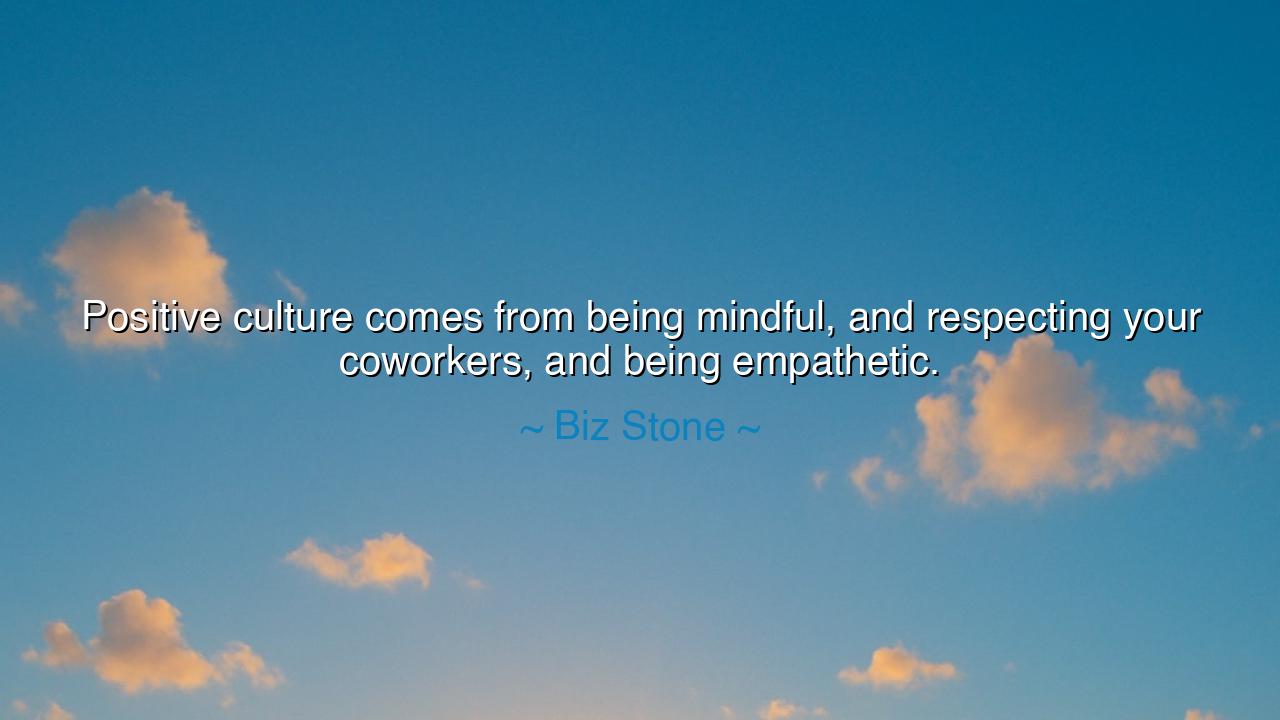
Positive culture comes from being mindful, and respecting your
Positive culture comes from being mindful, and respecting your coworkers, and being empathetic.






When Biz Stone declared, “Positive culture comes from being mindful, and respecting your coworkers, and being empathetic,” he revealed a truth that transcends the walls of offices and workplaces, reaching into the very fabric of human community. His words remind us that no enduring success is built upon arrogance or strife. True greatness arises where mindfulness guides the spirit, where respect shapes our dealings with others, and where empathy softens the hardness of the human heart. A culture without these pillars collapses into discord, but one rooted in them becomes fertile ground for flourishing.
The ancients, too, grasped this wisdom. The philosophers of China spoke of ren, the virtue of human-heartedness, teaching that harmony in society is born from compassion and respect for others. The Stoics of Rome counseled that one must always be mindful of the common good, for each person is a thread in the fabric of the whole. Biz Stone’s words are the modern echo of these teachings: that a positive culture is not accidental, but cultivated through deliberate choices of kindness and awareness.
History offers luminous examples of such truth. Consider the story of Ernest Shackleton, the Antarctic explorer. When his ship, the Endurance, was trapped and destroyed by ice, his men faced certain death. Yet Shackleton’s mindfulness of their needs, his respect for their dignity, and his deep empathy for their suffering created a culture of hope and unity that carried them through unimaginable hardship. Not one life was lost. His leadership proved that even in the harshest conditions, positive culture sustains life where despair would destroy it.
Biz Stone’s teaching also strikes at the heart of human ambition. Many seek greatness through domination or selfish pursuit, but this path sows bitterness. To be mindful is to pause and recognize the needs of others. To show respect is to acknowledge their worth. To practice empathy is to feel their joys and sorrows as your own. These virtues do not weaken a leader or a worker; they strengthen the bonds that make collective success possible.
At the heart of his wisdom lies the reminder that culture is not written in policies or etched in stone — it is lived in daily acts. A kind word, an attentive ear, a willingness to see beyond oneself: these are the quiet bricks from which a thriving community is built. Just as drops of water carve valleys through stone, so too do small acts of mindfulness, respect, and empathy shape the destiny of a workplace, a family, or a nation.
The lesson is clear: if we desire to create a positive culture, we must begin with ourselves. We must cultivate mindfulness, not rushing blindly through life but being present and aware. We must extend respect to all, from the highest to the humblest. We must practice empathy, seeking to understand before judging. In this way, each of us becomes a bearer of light, contributing to an atmosphere where others can grow.
In practice, this means pausing before you speak, listening deeply to those around you, and acknowledging their contributions with sincerity. It means resisting the temptation to belittle or to dismiss, and instead choosing to uplift. It means stepping into another’s shoes, striving to understand their struggles, and offering support rather than scorn. Such actions may seem small, but together they weave the fabric of a culture that nourishes all.
Therefore, let us remember Biz Stone’s wisdom: positive culture is born of mindfulness, respect, and empathy. Carry these virtues into your work, your friendships, your family, and your community. For when these qualities guide us, we do more than build strong teams — we build strong souls, and the legacy of such a culture will echo across generations.






CNChi Nguyen
Reading this, I feel inspired but also slightly challenged—how do you create a culture that consistently fosters empathy and mindfulness? What happens when conflicts arise despite best efforts? I’d like to explore practical steps or tools companies can use to encourage these behaviors sustainably. Additionally, how can employees hold each other accountable for respectful behavior without creating tension or resentment? A deeper discussion about implementation versus idealistic aspiration would be helpful.
HYHoang Yen
I’m intrigued by the idea that positive culture is shaped primarily by interpersonal attitudes. How can leadership model these traits effectively without seeming insincere or performative? Also, in a diverse workplace where cultural norms and personal values differ, what strategies ensure that empathy and respect are genuinely inclusive rather than unintentionally biased? Exploring the nuances of how these values are interpreted across different teams could reveal whether positive culture is universally achievable or context-dependent.
KNKien Nguyen
This statement makes me curious about the measurable impact of empathy and mindfulness on workplace productivity and satisfaction. Are there studies that show a direct correlation between these behaviors and team performance? Additionally, could emphasizing these traits inadvertently create pressure on employees who struggle with emotional awareness or interpersonal skills? I’d like to hear a perspective on how to balance encouraging empathy without making it feel like an obligation or performance metric.
VTVo thu
I wonder how realistic it is to consistently practice mindfulness, empathy, and respect in a high-pressure work environment. Can employees genuinely maintain these behaviors when deadlines are tight and stress levels are high? Also, how much of positive culture depends on individual effort versus structural support from management? It would be interesting to explore whether cultivating such a culture is more effective through personal development initiatives or through formal policies and organizational design.